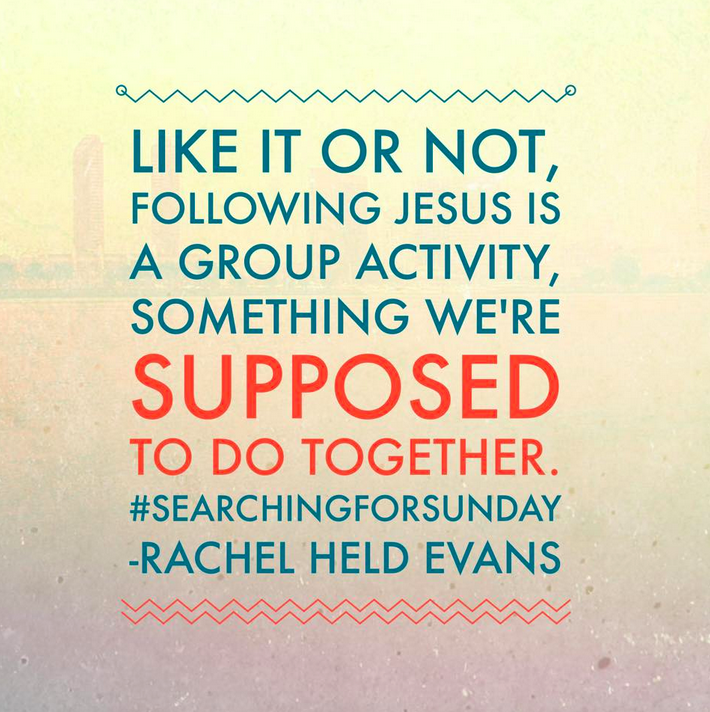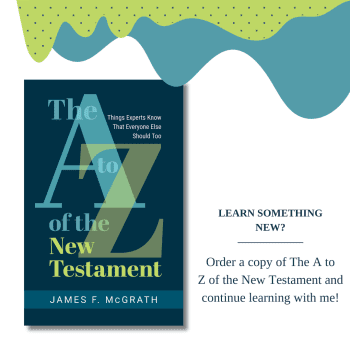I’m delighted to have the chance to review Rachel Held Evans’ forthcoming book, Searching for Sunday: Loving, Leaving, and Finding the Church. If you have read anything of hers before, this is classic Rachel Held Evans. You will laugh out loud, and you will cry. You will be moved by brutally honest stories about the church at its best and its worst, and will find yourself wondering how anyone could ever find Christianity attractive, and how anyone could ever find it unattractive.
The prologue is important and should not be skipped. Evans emphasizes that the story she tells is her own, although it includes snippets from others, and many more have said or will say that they can relate to it, and that it parallels theirs. Nonetheless Evans does not claim to be providing something that will bring current discussions about the future of the church to an end. She writes, “I can’t provide the solutions church leaders are looking for, but I can articulate the questions that many in my generation are asking” (p. xi). And already in the prologue she sets the theme for the rest of the book as she emphasizes that this generation has been hit with advertising throughout their lives, and can smell BS a mile away. And so they are not looking for a “hipper” Christianity, but a more authentic one (p.xii). What makes her book different from many others is precisely that it does not offer a ten step plan for your church’s future, but an account of hanging onto faith through challenges (p.xiv).
The remainder of the book is structured around the sacraments. I won’t try to work through each one in detail, but will instead share some of the things that made the most impact on me.
The book emphasizes honesty. Many have found that Alcoholics Anonymous has been, for them, the most spiritual community they have been a part of, because of the emphasis on being brutally honest with oneself as well as others. People within churches, on the other hand, are regularly silent about what they really think, about their doubts, and while churches often feature people speaking on the assumption that everyone present agrees with them, it is likely that far more congregations are ready to cope with our dissent than we may give them credit for. Who knows how many churches would be very different places if each person shared their views honestly? Towards the end of the book, the same theme comes to the fore as Evans explores the special role that LGBT Christians may have in teaching the church afresh how to be Christian (p.216). And she puts it eloquently and memorably, time and time again, as for instance when she writes, “Here they were, being the church that had rejected them. I felt simultaneously furious at Christianity’s enormous capacity to wound and awed by its miraculous capacity to heal” (pp.212-213). Honesty is also one of the reasons that Evans continues to be a Christian: Christianity names sin and refuses to allow us to fail to acknowledge that the evil we see in the world is also found within us (p.67). And she muses (on p.112):
I often wonder if the role of the clergy in this age is not to dispense information or guard the prestige of their authority, but rather to go first, to volunteer the truth about their sins, their dreams, their failures, and their fears in order to free others to do the same. Such an approach may repel the masses looking for easy answers from flawless leaders, but I think it might make more disciples of Jesus, and I think it might make healthier, happier pastors. There is a difference, after all, between preaching success and preaching resurrection.
The relationships of people to churches are compared more than once with dating relationships between two people. We break up with churches. We are haunted by the ghosts of our past churches. We turn to new churches on the rebound, not warning them that the relationship is unlikely to last. And in her own case, someone compared her continued writing about Evangelicalism as akin to compulsively checking the Facebook page of a boyfriend you broke up with two years earlier (p. 218). A key theme in the book is that, however much we grow beyond them, our experiences shape us, and “I can no more break up with my religious heritage than I can with my parents” (p.221). And she compares her relationship to Evangelicalism to “a Taylor Swift song set to repeat.”
Evans describes being a zealous member of the youth group, and that others with a similar zeal must now think about her the way she thought about others, labeling them as “nominal” and “lukewarm.” But then she writes that “there is nothing nominal or lukewarm or indifferent about standing in this hurricane of questions every day and staring each one down until you’ve mustered all the bravery and fortitude and trust it takes to whisper just one of them out loud” (p.187).
There were, as I said, parts that made me laugh out loud. The mention of someone who thought that an “Evangelical Free Church” was a church without Evangelicals, akin to “sugar-free gum” was one (p. 9). Another is when she suggests that (in a moment when she had “gone all Martin Luther” in the bookstore at a Benedictine abbey) Catholics selling holy water is not all that different from Evangelicals selling Duck Dynasty-themed Bibles (p.175). But there are many more.
 It is always possible to find some things to criticize, and as a scholar of early Christianity, I noted some relatively minor issues (which may actually get sorted out in the final version, I imagine, since the advance copy is always an uncorrected proof) related to the depiction of Constantine’s role in the church becoming more liturgical, as well as rendering of Greek and Hebrew. But anyone who focused on such things and missed the big picture of the book would have fallen into one of the traps Evans warns about based on her own experience. Often we over-intellectualize things when we interact with churches, precisely as a way of insulating ourselves and protecting ourselves. Evans tells an amusing story of having complained about details in a sermon, such as assuming Mosaic authorship of the Pentateuch, only to have it pointed out that the sermon in question was actually about humility (p.86).
It is always possible to find some things to criticize, and as a scholar of early Christianity, I noted some relatively minor issues (which may actually get sorted out in the final version, I imagine, since the advance copy is always an uncorrected proof) related to the depiction of Constantine’s role in the church becoming more liturgical, as well as rendering of Greek and Hebrew. But anyone who focused on such things and missed the big picture of the book would have fallen into one of the traps Evans warns about based on her own experience. Often we over-intellectualize things when we interact with churches, precisely as a way of insulating ourselves and protecting ourselves. Evans tells an amusing story of having complained about details in a sermon, such as assuming Mosaic authorship of the Pentateuch, only to have it pointed out that the sermon in question was actually about humility (p.86).
The book does not offer a single solution – indeed, at one point Evans emphasizes that “A worldwide movement of more than two billion people reaching every continent and spanning thousands of cultures for over two thousand years can’t expect homogeneity. And the notion that a single tradition owns the lockbox on truth is laughable, especially when the truth we’re talking about is God” (p.183). But it is honest, it is quotable, and it provides reason for hope as well as despair. Because, if our own churches cannot handle the honesty, the community, the support, the care, and everything else that people need, then they may die – but “a little death and resurrection might be just what church needs right now…Death is something that empires worry about, not something gardeners worry about. It’s certainly not something resurrection people worry about” (p.225). There are signs that some churches are embracing the challenge to be more authentic, to stop offering a cheap imitation of something people can get elsewhere and offer something difficult and demanding and real. But if not, that is OK.
I highly recommend this book. I am seriously considering getting my own Sunday school class to read it. I think that anyone interested in what the church can and should be in the present day, the challenges it faces and the opportunities it risks missing, ought to read the book. I look forward to the conversations it will undoubtedly generate.

















